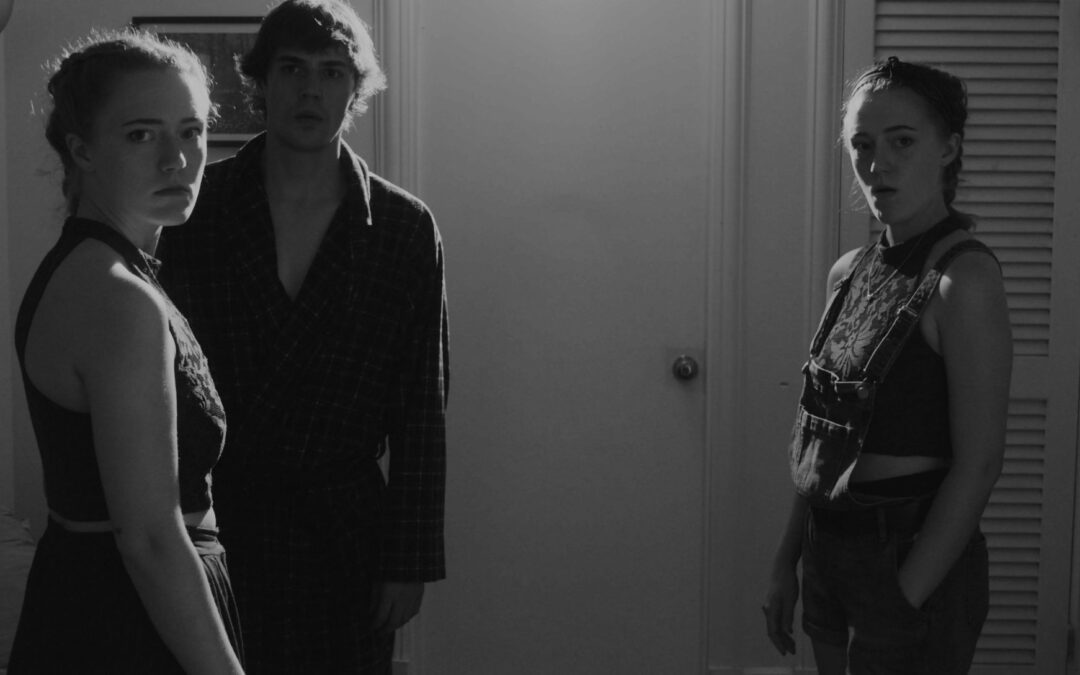(Random Media)
Boredumb Pictures, 2022. Sci-fi. 1 hr 8 min.
Grade: 4 out of 4
It’s always impressive, and pleasing, to see a movie that transcends the limits of its production, creatively writing around the obstacles at hand, or even turning them into strengths. Far rarer, and exponentially more impressive, is a movie so well-crafted to its surroundings that its limitations feel as though they were necessary prerequisites; where even if another million dollars were thrown its way, it could not be any better than it already is. Backwards Faces, shot entirely inside a one-bedroom apartment with two actors, is such a miracle. Clearly conceived with maximum production convenience in mind, and a couple of necessary effects shots that are only noticeable because they depict something reality can’t, it’s a project so good I almost wished it were longer. Except that when the ending did come, an hour and eight minutes in, it was so note-perfect I couldn’t object.
Ken (Andrew Morra) and Syd (Lennon Sickels) sit on opposite sides of the bed, having hooked up the night before. He asks her if he was any good; her face displays the contempt before she verbalizes it. They spar with their banter: she aiming to wound, he looking for conciliation. And then, to keep her from leaving, he drops the bombshell: “My bathroom is a unique structure that links disparate points in space time.”
“That’s what you’re going with?” she retorts. It’s an absurd claim nobody would believe, at least until he goes into the bathroom and emerges an entirely different version of himself with alternate memories.
Currently available on Prime Video, Apple TV, and Vudu, Backwards Faces deserves wider distribution; it’s an early contender for best movie of the year. Fans of Everything Everywhere All at Once who want to see more movies like that, but not the same as it, should particularly appreciate its charms. Like the multi-Oscar winner, it deals with the Multiverse. Unlike it, it lacks visual pyrotechnics, using moody black and white cinematography to bring cinematic life to an otherwise generic living space. It compensates by having maybe the best-ever script about infinite possibilities and realities. While solidly grasping quantum physics, at least to this neophyte’s ear, it also uses both science and clever wordplay to deliver genuinely hilarious “Who’s on first” riffs, in addition to philosophical musings that build to an ingenious emotional climax.
Everyone involved is a relative cinematic newcomer, from writer-director-editor Chris Aresco to the leads, and composer Nathaniel Meeks, who turns a low-budget synth score into a moment-punctuating asset rather than the annoyance it can so often be. Aresco’s script features dialogue as rapid-fire as – but far less redundant than – Aaron Sorkin; Morra and Sickels, sometimes playing more than one version of their characters at the same time, deliver it to perfection. In a space this small and sparse, cinematography and editing matters a lot, and D.P. Jake Gorr shoots the shadows and penetrating outside light like a champ, with Aresco editing in a way that never allows for visual boredom but serves the dialogue exchanges perfectly. All of them should see their stock rise if there’s any justice in this business. (Shh. Don’t spoil my very real optimism.)
The title derives from the difference between the way we see ourselves and the way others do – used to looking in mirrors, we’re actually seeing ourselves backwards. Were we to look upon our own face on another human being, it would appear reversed. There’s a deeper meaning also, as characters speculate that with every possibility becoming real, there must exist at least one timeline where the laws of thermodynamics run the opposite way. Every new choice creates infinite possibilities across every timeline, and the question then becomes what you do in this one, if the consequence of every possible decision already exists somewhere else? And no, it’s not as simple as love and self-sacrifice conquering all. Though it might be, in another dimension.
I suspect my late father-in-law, a former intelligence operative who studied quantum physics as a hobby, and who didn’t care for too many movies, would enjoy this one. My own father, who had trouble following more complex plots, might have felt otherwise, insisting on trying to work backwards in a story that specifically denies the flow of time. It seems to me to hold up under its own logic, and while I can’t speak for every viewer, I suspect the snappy interplay between Syd and Ken…and Syd and Ken…will work to paper over any potential gaps in multiversal comprehension. This is one of those movies where characters, rather than talking like real people you know, talk like people far sharper and smarter than you know. But it’s never in that self-conscious Joss Whedon kind of way; more the rhythms of an educated playwright who lets his smarts inform the story rather than enhancing his own ego and self-image.
Aresco deserves to work with bigger budgets, but he’s so good with this small one that it might be a loss to have him upsize. Such aesthetic concerns aside, he and his cast and crew deserve every success coming to them. In several other timelines, they already have it.

